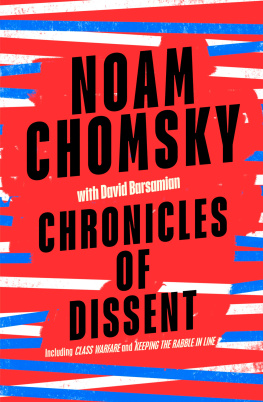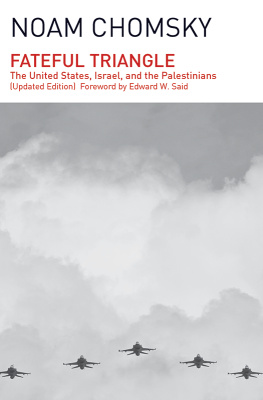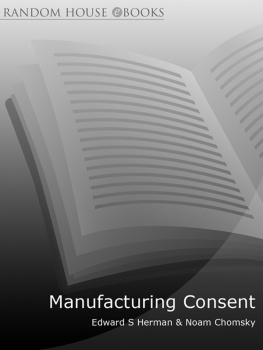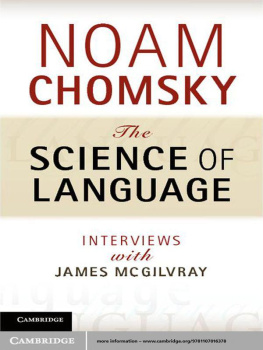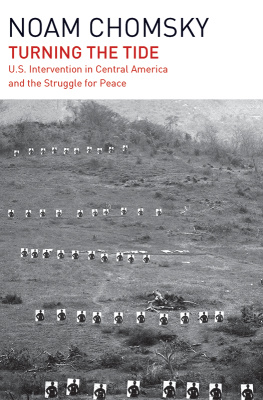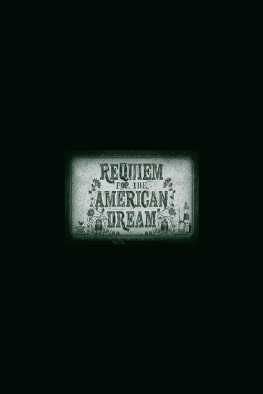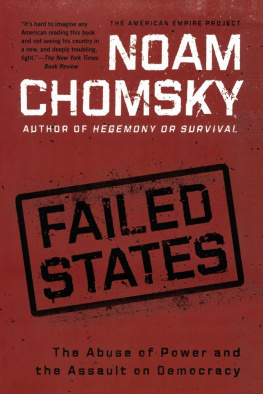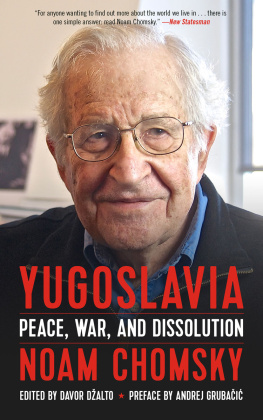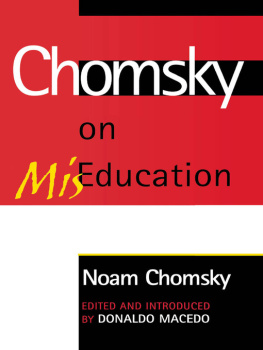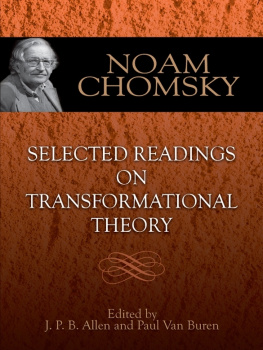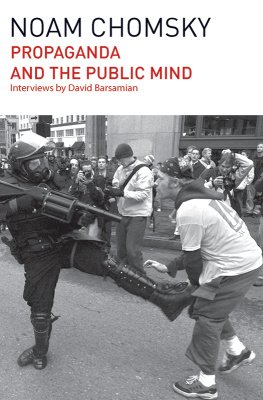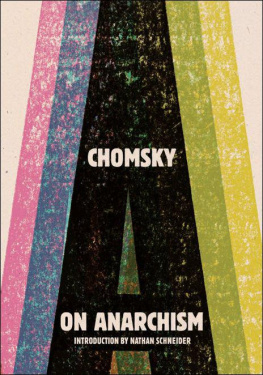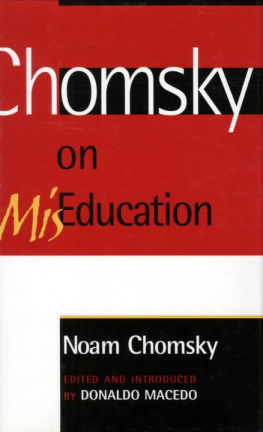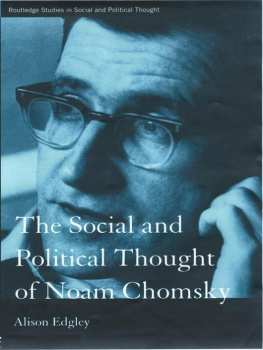Noam Chomsky
CHRONICLES OF DISSENT
INTERVIEWS WITH DAVID BARSAMIAN

PENGUIN BOOKS
UK | USA | Canada | Ireland | Australia
New Zealand | India | South Africa
Penguin Books is part of the Penguin Random House group of companies whose addresses can be found at global.penguinrandomhouse.com.

First published as three volumes: Chronicles of Dissent (1992), Keeping the Rabble in Line (1994) and Class Warfare (1996) by Common Courage Press in Monroe, Maine
First published in the United States of America in one volume as Chronicles of Dissent by Haymarket Books 2022
First published in Great Britain by Hamish Hamilton 2022
Copyright David Barsamian and Valeria Chomsky, 2022
The moral right of the copyright holders has been asserted
This book was published with the generous support of Lannan Foundation and Wallace Action Fund
ISBN: 978-0-241-99005-6
This ebook is copyright material and must not be copied, reproduced, transferred, distributed, leased, licensed or publicly performed or used in any way except as specifically permitted in writing by the publishers, as allowed under the terms and conditions under which it was purchased or as strictly permitted by applicable copyright law. Any unauthorized distribution or use of this text may be a direct infringement of the authors and publishers rights and those responsible may be liable in law accordingly.
Foreword
David Barsamian
You walk into the room with your pencil in your hand
You see somebody naked and you say, Who is that man?
You try so hard but you dont understand
Just what you will say when you get home
Because something is happening here but you dont know what it is
Do you, Mr. Jones?
Bob Dylan, Ballad of a Thin Man
Its a very frightened country.
Everybody thinks somebody is doing something to them,
and they dont exactly know who.
They dont understand why theyre badly off.
Theres a sense that somebody is taking something from us that we deserve.
You cant see whats really happening, because thats off the agenda.
Noam Chomsky, Chronicles of Dissent
For years Noam Chomsky has been explaining what is happening here. What is left to say about him? Let me try. He probably holds the worlds record for giving the most interviews. Ive been fortunate enough to have done quite a few of them. But our very first one, on December 1, 1984, Language in the Service of Propaganda, almost didnt happen. Noam was at home in Lexington, Massachusetts. It was a Saturday morning. I was in the studios of KGNU radio in Boulder, Colorado. I was a bit nervous and unsure about the tech. And wouldnt you know it, I had trouble. I was unable to get the recording equipment to work properly. I told Noam I was having trouble. He said, not to worry, call me back when you get it sorted. I finally figured out which button to press, and we did the interview. The rest, as they say.
Imagine you have a blank map, and you need to fill in the empty spaces. Who would you turn to? Noam Chomsky. Few have the knowledge to draw the lines of longitude and latitude. He is the cartographer par excellence placing the continents, islands, and oceans properly in place. And highlighting areas of special interest to him, such as Palestine, East Timor, Grenada, Indonesia, Haiti, Vietnam, and crucially the United States, the Empire. As Conrad writes in Heart of Darkness, The conquest of the earth, which mostly means the taking it away from those who have a different complexion or slightly flatter noses than ourselves, is not a pretty thing when you look into it too much. Chomsky has never flinched from going into the darkness and exposing its lies and delusions, peeling away the arrogance and hypocrisy of elites. He makes apologists for imperialism and predatory capitalism deeply uncomfortable.
I knew about Chomsky in the early 1970s, after I had returned to the United States from five years living in Asia, most of it in India. I recall in particular an article he wrote in the Yale Law Review on Vietnam. I was awed by his unambiguous language. There was no beating around bushes or foggy language and euphemisms. He called out the Empire and its crimes with a righteous fury. Indignation leapt out from the page.
Chomsky has a remarkable syncretic ability to not only retain vast amounts of information from a multiplicity of sources but to cohere them into a cogent whole.
Hes never off his game. He reminds me of the master musicians I knew in India. At any time in the day or night, they would be able to recall nuanced details of complex ragas. As Alexander Cockburn says in his introduction to the original edition of Chronicles of Dissent, included in this new expanded volume, Chomsky knows the score.
Despite his legendary output, Chomsky says in Class Warfare, I should be doing way more. That view of his prodigious work is indicative of Chomskys profound moral commitments. For decades hes been indispensable to countless individuals and groups. In many interactions with others, Ive witnessed him to be kind, generous, and patient, never letting people feel awkward or inadequate.
Hes been a catalyst and inspiration for many initiatives, campaigns, and organizations. Alternative Radio is one of the many seeds he has planted.
Sometimes people say Chomsky is a downer. I disagree. I think telling the truth is a moral affirmation and, in a sense, liberating. Hope? It has to be rooted in reality, not fantasy. In his words, If you assume that there is no hope, you guarantee that there will be no hope. If you assume there is an instinct for freedom, that there are opportunities to change things, then there is a possibility that you can contribute to making a better world.
This volume is three books in one: Chronicles of Dissent, Keeping the Rabble in Line, and Class Warfare. It encompasses my interviews with Noam Chomsky between 1984 and 1996. All three books were originally published by Common Courage Press. The locales varied from his office at the Massachusetts Institute of Technology (MIT), to a kitchen table in Woods Hole, Massachusetts, to a hotel room in Boulder.
I am thrilled that Chronicles of Dissent is available again in this collected format. Special thanks to Noam Chomskyand to Anthony Arnove and Haymarket Books.

Part I
CHRONICLES OF DISSENT
INTRODUCTION
Excavating the Truth
Chomsky went to the dentist, who made his inspection and observed that the patient was grinding his teeth. Consultation with Mrs. Chomsky disclosed that teethgrinding was not taking place during the hours of sleep. When else? They narrowed it down quickly enough to the period each morning when Chomsky was reading the New York Times, unconsciously gnashing his molars at every page.
I asked Chomsky why, with the evidence and experience of a lifetime, he kept hoping against hope that the corporate press, particularly the New York Times

